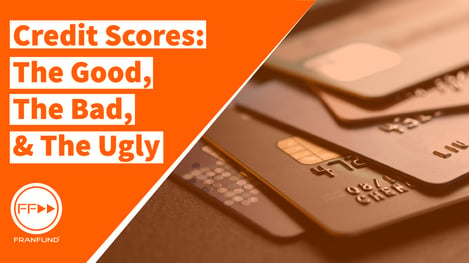Dos and Don’ts in Credit: How to Qualify for a Bigger Business Loan
You probably know what a credit score is, but do you know how to protect it? By understanding what affects your credit score, you can make better...
Did you know your credit score is an important part of starting a business? Keep reading to learn more about credit, how your credit score is calculated, as well as how it’s used when funding a new franchise.
Credit Score 101: What is Credit?
Credit is an agreement to borrow money from a lender — such as a bank or other financial institution — under the agreement to pay it back at a later date, typically with interest. Your credit score is a rating that lenders use to evaluate your creditworthiness, or how likely it is that you’ll pay back what you borrow. This score is built using information from three major credit bureaus: TransUnion, Equifax, and Experian.
Most credit score models range from 300-850. Generally, the higher your score, the better you look to potential lenders. A good credit score of 680 or higher gives you a better chance of getting approved for a loan. A higher credit score will also generally get you better loan terms, such as lower interest rates.

Why Does Your Credit Score Matter When Opening a Business?
Although your credit score is based on personal borrowing history, it can play an important role when starting a business. Your franchise won’t have any business credit history in the beginning. Most lenders will instead use your credit score to determine if you’re eligible for a business loan.
Your credit score is one of the biggest factors in determining whether you get approved for franchise financing. You’ll need a good credit score to get approved for the most desirable financing terms.
What Impacts Your Credit Score?
There are different types of credit scores. While each model uses slightly different equations to calculate your score, there are several common factors most models use.
Your credit score is just one factor in securing the right level of funding for your start up. If you are ready to explore funding options for your new business, contact FranFund today to help kickstart your enterprise.
FranFund designs flexible funding plans that help new and experienced business owners fund their franchises. We have a powerful and accurate pre-approval process with a 99% success rate in obtaining loans for borrowers who received FranFund pre-approval! Beyond this, we offer ongoing support and ensure our clients know all of their options for funding single units through multi-unit expansions, including SBA loans, conventional lending, and retirement plan funding.
Along with the right planning and the faith you have in yourself, use these signs as the motivation you need to take the next step.
Are you ready? If today is the day, schedule a free consultation to discuss your business funding options.

You probably know what a credit score is, but do you know how to protect it? By understanding what affects your credit score, you can make better...

When it comes to growing a franchise, the financial health of your first 10-20 franchisees plays a critical role in setting the stage for your...

Starting your franchise business is probably one of the most exciting things you have ever done. And it should be! You’re embarking on a new career...
.png)